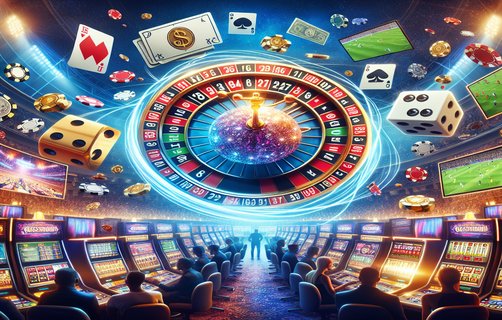The Psychology and Strategy of Poker Betting
पोकर बेटिंग की मनोविज्ञान और रणनीति
Engaging in a poker game transcends mere luck; it is an intricate mix of psychology, strategy, and long-term planning. Understanding the mental control required and the ability to focus can often separate the winners from the losers. A strong player must train their mind to stay calm and maintain clarity, especially in high-stakes situations. Without clarity, even the best strategies can crumble under pressure.
Long-term strategy in poker revolves around patience and the willingness to understand both the game and the opponents. It’s essential to develop a comprehensive approach that incorporates not just the cards dealt but also the betting patterns and tendencies of fellow players. For instance, a player who understands the importance of slow play can capture more chips over time than someone who aims for immediate gains.
Chance plays a crucial role in poker; however, proficient players find methods to predict and mitigate this uncertainty. Techniques such as pot odds calculation and implied odds analysis empower a player to make informed decisions. Utilizing these analytical methods invites a higher degree of precision in betting and encourages disciplined play.
Short-term profit maximization is a seductive element of poker. Impulsive players often make rash decisions based on transient luck. However, this short-sighted approach tends to unravel against more analytical players who prioritize accumulated knowledge and practice over randomness. In poker, every hand is a part of a larger narrative, and overlooking this can lead to significant losses.
Understanding the pathways of various players—whether they are conservative, aggressive, or simply unpredictable—serves as a cornerstone for devising effective strategies. Each player has a unique strategy shaped by their experience and psychological makeup. Learning to identify and adapt to these pathways allows a player to exploit weaknesses and enhance their chances of victory.
Money allocation is yet another critical facet in developing a successful betting strategy. Deciding how much to risk on any given hand involves understanding bankroll management principles. Effective players respect their bankrolls, only wagering amounts that preserve their ability to play long-term. This restraint fosters a healthy relationship with risk and ensures that a bad streak won’t prematurely end their poker journey.
In conclusion, poker is more than a game of cards; it is a complex interplay of psychological resilience, strategic thinking, and analytical skill. Players must develop mental control to stay focused, devise long-term strategies, and accurately assess chance to improve their predictions. Through understanding the players’ pathways and effectively allocating money, a player can enhance their overall poker prowess.

पोकर का खेल केवल किस्मत पर निर्भर नहीं होता; यह मनोविज्ञान, रणनीति और दीर्घकालिक योजना का जटिल मिश्रण है। मानसिक नियंत्रण और फोकस की आवश्यकता को समझना अक्सर विजेताओं को हारने वालों से अलग करता है। एक मजबूत खिलाड़ी को अपने मन को शांत रखने और स्पष्टता बनाए रखने के लिए प्रशिक्षित करना चाहिए, विशेषकर उच्च दांव वाली स्थितियों में। बिना स्पष्टता के, सबसे अच्छी रणनीतियाँ दबाव में ढह सकती हैं।
पोकर में दीर्घकालिक रणनीति धैर्य और न केवल खेल बल्कि प्रतिद्वंद्वियों को समझने की इच्छा के चारों ओर परिभाषित होती है। यह एक व्यापक दृष्टिकोण विकसित करना आवश्यक है जिसमें केवल डील किए गए कार्ड नहीं बल्कि साथी खिलाड़ियों के दांव लगाने के पैटर्न और प्रवृत्तियों को भी शामिल किया गया है। उदाहरण के लिए, एक खिलाड़ी जो धीमी खेल की महत्ता को समझता है, समय के साथ अधिक चिप हासिल कर सकता है बनिस्बत किसी ऐसे व्यक्ति के जो तुरंत लाभ के लिए प्रयास करता है।
किस्मत पोकर में महत्वपूर्ण भूमिका निभाती है; हालाँकि, कुशल खिलाड़ी इस अनिश्चितता की भविष्यवाणी करने और उसे कम करने के तरीकों को खोज लेते हैं। पॉट ऑड्स गणना और इम्प्लाइड ऑड्स विश्लेषण जैसी तकनीकें एक खिलाड़ी को सूचित निर्णय लेने के लिए सशक्त बनाती हैं। इन विश्लेषणात्मक पद्धतियों का उपयोग करने से दांव लगाने में अधिक सटीकता और अनुशासित खेल को प्रोत्साहित किया जा सकता है।

अल्पकालिक लाभ अधिकतमकरण एक लुभावनी विशेषता है। आवेगपूर्ण खिलाड़ी अक्सर अस्थायी किस्मत के आधार पर तात्कालिक निर्णय लेते हैं। हालाँकि, यह अल्पकालिक दृष्टिकोण अधिक विश्लेषणात्मक खिलाड़ियों के मुकाबले बेधड़क हो जाता है जो याद रखेंगे कि ज्ञान और अभ्यास का संचय यादृच्छिकता से कहीं अधिक महत्वपूर्ण है। पोकर में, हर हाथ एक बड़े कथानक का हिस्सा है, और इसे नजरअंदाज करने से महत्वपूर्ण नुकसान हो सकता है।
विभिन्न खिलाड़ियों के पथों को समझना—चाहे वे संवेदनशील हों, आक्रामक हों, या बस अप्रत्याशित हों—प्रभावी रणनीतियों के निर्माण के लिए एक आधारशिला के रूप में कार्य करता है। प्रत्येक खिलाड़ी की रणनीति उनके अनुभव और मनोवैज्ञानिक मेटामॉर्फोसिस से आकारित होती है। इन पथों की पहचान करना और उनके अनुसार अनुकूलन करना एक खिलाड़ी को कमजोरियों का दोहन करने और जीतने की संभावनाओं को बढ़ाने की अनुमति देता है।
पैसे का आवंटन भी एक सफल बेटिंग रणनीति में एक महत्वपूर्ण पहलू है। किसी भी दिए गए हाथ पर कितना जोखिम उठाना है इसका निर्णय बैंक रोल प्रबंधन के सिद्धांतों को समझने में शामिल होता है। प्रभावी खिलाड़ी अपने बैंक रोल का सम्मान करते हैं, केवल उन राशियों पर दांव लगाते हैं जो दीर्घकालिक खेलने की क्षमता को बनाए रखती हैं। यह संयम जोखिम के साथ एक स्वस्थ रिश्ते को बढ़ावा देता है और सुनिश्चित करता है कि एक बुरा सिलसिला जल्दी से उनके पोकर के सफ़र को समाप्त नहीं करेगा।
अंत में, पोकर जादुई कार्डों का खेल नहीं है; यह मनोवैज्ञानिक सहनशक्ति, रणनीतिक सोच और विश्लेषणात्मक कौशल का जटिल इंटरप्ले है। खिलाड़ियों को मानसिक नियंत्रण विकसित करना चाहिए, ध्यान केंद्रित करना चाहिए, दीर्घकालिक रणनीतियाँ बनानी चाहिए, और भविष्यवाणियाँ बेहतर करने के लिए किस्मत का उचित मूल्यांकन करना चाहिए। खिलाड़ियों के पथों को समझकर और पैसे का प्रभावी आवंटन कर, एक खिलाड़ी अपनी कुल पोकरी कौशल को बढ़ा सकता है।

comments
AceChaser
This article really dives deep into the strategic aspects of poker. Love the emphasis on mental control!
CardShark
The insights on player pathways are invaluable. Knowing how to read opponents is key!
BetWizard
I appreciate the focus on long-term strategy. Too many players chase short-term gains.
RiskTaker87
Bankroll management is so crucial! Glad to see it highlighted in this analysis.
Strategist101
Great breakdown of chance and prediction methods. Definitely a must-read for any serious player.
BluffMaster
The mental aspect of poker is often overlooked. This article nailed it!